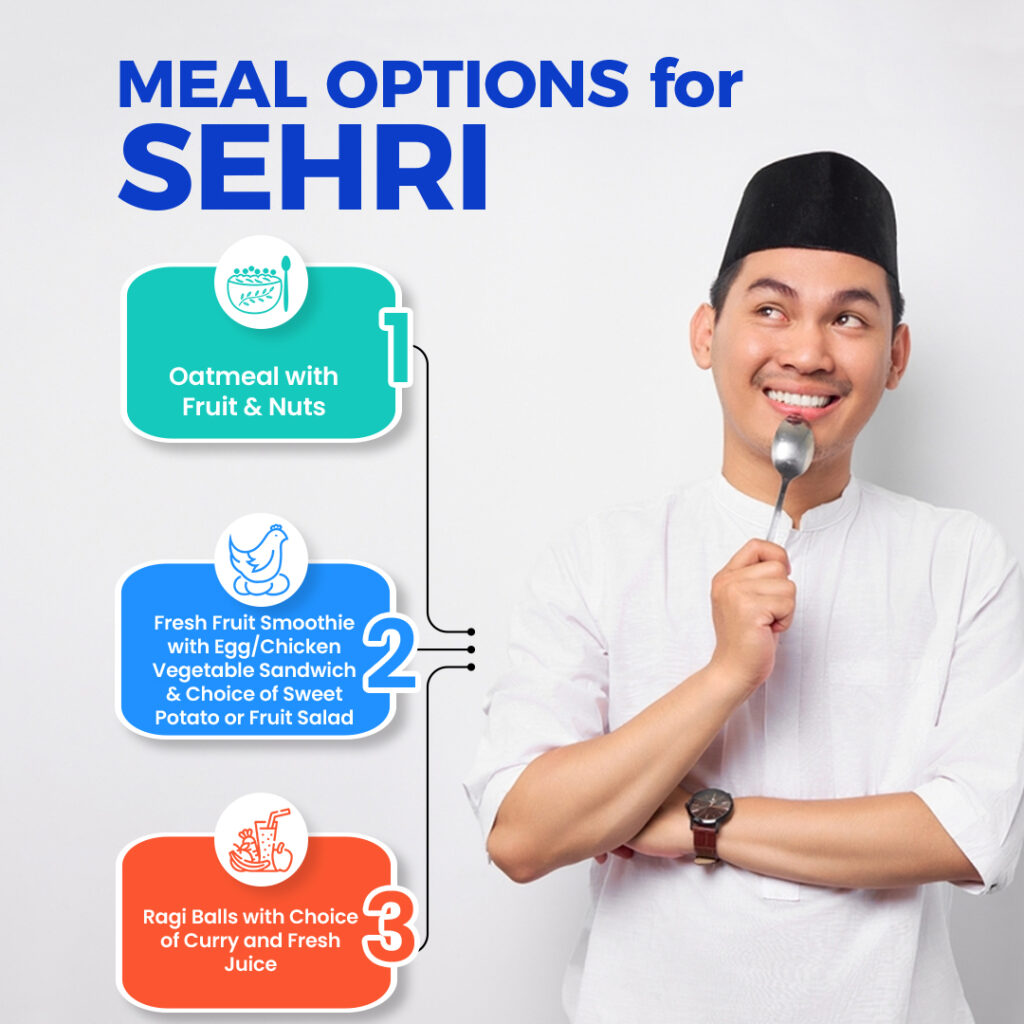
Blog Highlight - Unlock the secrets of a healthy Ramadan diet plan to nourish your body during this sacred month. Know optimal food choices for overall well-being.
Ramadan is here, the holy month that Muslims all over the world celebrate. In addition to a time of spiritual reflection, this month can help you develop mindful eating habits essential for weight-loss and good health in general.
Fasting is not the only thing attached to Ramadan, it’s also about eating healthy food substances that can nourish our body while avoiding unhealthy junk. However, fasting from dawn to sunset can be demanding both physically and mentally; thus, there is a proper way of approaching a healthy Ramadan diet program.
Therefore, in this blog, we will discuss the principles of mindful eating during Ramadan as well as give a Ramadan diet plan that will enable you to maximize your weight loss goals in this blessed month.
During the month of Ramadan, Muslims do not drink or eat anything from the time the sun rises till it sets. This means you can’t have any food, drinks, or even have intimate relations during the fasting hours. It provides Muslims worldwide with a special time to connect more spiritually with Allah, and allows them to reflect on their faith, and helps them strengthen their self-control.
Muslims are allowed to eat before the sun rises, which is called Suhoor, or the early morning meal. Once the sun sets, they are allowed to break their fast, which is also called Iftar. And this is where you can practice mindful eating, which is about being fully present and aware of your eating experience.
It involves paying attention to the food you eat, as well as recognizing hunger and sensations of feeling full. Incorporating a mindful eating strategy into your Ramadan Diet Plan can enrich your spiritual experience and foster improved health during the holy month
Sehri, the pre-dawn meal, is crucial during Ramadan as it provides the energy and hydration needed to sustain you throughout the day. When planning your Sehri, try to opt for nutrient-rich foods that will keep you feeling satisfied and energized.
You can incorporate complex carbohydrates like whole grains, fruits, and vegetables like spinach, which release energy slowly and help maintain blood sugar levels.
Include sources of lean protein such as eggs, yogurt, or lean meats to promote muscle repair and satiety. Don't forget to hydrate by drinking plenty of water and avoiding caffeinated beverages, which can lead to dehydration.
Breaking the fast, or Iftar, is a moment of celebration and gratitude. However, it's essential to break your fast mindfully to avoid overeating and digestive discomfort. Start with a few sips of water and a few dates to replenish your energy and hydrate your body.
Follow this with a balanced meal consisting of a variety of food groups. Incorporate vegetables, salads, and soups to provide fiber, vitamins, and minerals. Include lean proteins such as grilled chicken or fish and healthy fats from sources like olive oil, nuts, and avocados.
Post Maghrib is the time that starts once the fast is broken, after the evening Maghrib prayers. Begin by breaking your fast with a couple of dates and water, following the tradition of the Prophet Muhammad (peace be upon him).
Then, opt for a balanced meal consisting of nutrient-rich foods such as fruits, vegetables, lean proteins, and whole grains. This combination helps replenish energy levels and provides essential vitamins and minerals.
After completing the late evening prayer, or "Isha," Muslims come together for their final meal of the day during Ramadan. This post-Isha time signifies the end of a day of fasting and offers a chance for nourishment and contemplation. I
t's important to choose nutrient-rich foods like fruits, vegetables, lean proteins, and whole grains for a balanced meal. Alongside food, staying hydrated with water and avoiding sugary or caffeinated drinks supports overall well-being.
Here are 3 meal options for Sehri (pre-dawn meal) during Ramadan.

Start your day with a bowl of oatmeal topped with sliced bananas, berries, and a handful of nuts such as almonds or walnuts. Oatmeal is rich in fiber and complex carbohydrates, providing sustained energy throughout the day. The fruits add natural sweetness and essential vitamins, while nuts offer healthy fats and protein to keep you feeling full.
You can also start your Sehri with a revitalizing fresh fruit smoothie blended with bananas, strawberries, mangoes, and kiwis, complemented with Greek yogurt or almond milk for creaminess.
Pair it with a protein-rich egg or chicken vegetable sandwich stuffed with colorful veggies between whole grain bread. Choose between boiled sweet potato for sustained energy or a refreshing fruit salad for natural sweetness and hydration.
This balanced meal provides a mix of nutrients to fuel your body during the fasting hours of Ramadan, ensuring a nourishing start to your day.
Opt for a wholesome Sehri by incorporating ragi balls paired with your preferred curry and a refreshing fresh juice. Ragi balls, made from nutrient-rich finger millet flour, offer a good source of fiber, calcium, and essential minerals.
Accompany them with moong dal curry, protein-packed egg curry, flavorful chicken curry, or a nutritious vegetable curry for a satisfying and balanced meal. You can complement your curry choice with a revitalizing apple-beetroot-carrot juice, rich in antioxidants and vitamins, or a cooling cucumber-mint juice for hydration and freshness.
Have a look at the healthy meal options for Iftar.

Break your fast with a delightful combination of dates paired with your preferred beverage and air-fried samosa. Dates, a traditional way to break the fast, provide natural sugars and essential nutrients to kickstart your day.
Accompany them with a hydrating drink choice such as tender coconut water, or opt for a cooling watermelon-basil seeds Sharbat for a burst of flavor. Pair your choice of beverage with air-fried samosa, which will offer you the same delicious taste with less oil.
Begin with dates, a traditional start to breaking the fast, as it provides natural sweetness and essential nutrients. You can also pair them with a nutrient-rich drink choice such as buttermilk or lassi without sugar, offering probiotics and protein for digestion.
Alternatively, you can indulge in a creamy fruit milkshake or a revitalizing sattu drink for sustained energy. Complete your meal with a vibrant fruit salad comprising a mix of three to four fruits, topped with almonds and walnuts for added crunch and healthy fats.
You can combine the sweetness of dates with nutritious apple beetroot carrot juice or a refreshing green vegetable juice. These drinks offer a boost of vitamins and antioxidants to kickstart your day.
Pair them with a bowl of fruits mixed in yogurt, topped with almonds and walnuts for added texture and healthy fats. This wholesome combination provides a balance of natural sugars, fiber, protein, and essential nutrients, ensuring a nourishing start to breaking your fast.
Check out the healthy meal options for Post Maghrib.
Start your post-fasting meal with steamed rice accompanied by your choice of curry - whether it's moong dal, fish or chicken. Add a nutritious touch with a side of green leafy vegetable sabzi, packed with vitamins and minerals.
Complement the meal with a refreshing cucumber-carrot-tomato salad, offering a burst of flavors and essential nutrients. Complete it with a serving of cooling curd or yogurt, providing probiotics for gut health.
You can indulge in a healthy and wholesome spread featuring grilled chicken kabab or paneer tikka paired with whole wheat roti or jowar roti. Accompany the protein-rich kabab or tikka with a comforting sabzi made from bottle gourd, ridge gourd, or ladies finger, brimming with essential vitamins and fiber.
You can pair the meal with a refreshing cucumber-carrot-tomato salad, which adds a burst of freshness and nutrients. Finally, include a serving of cooling curd or yogurt, providing probiotics for digestive health.
You can also indulge in grilled fish or paneer tikka, accompanied by a fragrant mixed vegetable pulao made with your choice of rice or broken wheat. Enhance the meal with a side of stir-fried or steamed vegetables, offering a medley of colors and nutrients.
Complement the savory dishes with a refreshing cucumber-carrot-tomato salad, adding a burst of freshness to the palate. Complete the ensemble with a serving of cooling curd or yogurt, providing probiotics for gut health.
A list of healthy meal options for post-late Namaaz.
You can have the last meal of your day with a refreshing and hydrating blend of fresh fruit salad paired with a cooling beverage like buttermilk or lassi, without added sugar.
You can also have seasonal fruits, such as watermelon, mango, apples, and pineapple, for a burst of natural sweetness and essential nutrients. Finish the fruit salad with a chilled glass of buttermilk or lassi, that offers probiotics and protein.
You can have a simple yet powerful combination of a glass of milk infused with chia seeds as the last meal of the day. Milk provides essential nutrients like calcium, protein, and vitamins, while chia seeds offer a boost of fiber, omega-3 fatty acids, and antioxidants. Simply soak chia seeds in milk for a few minutes to allow them to swell and create a pudding-like texture.
You can also indulge yourself with a sweet and wholesome fruit custard sweetened with jaggery. This traditional dessert is made by combining creamy custard with a variety of fresh fruits such as bananas, apples, grapes, and mangoes, offering a burst of natural sweetness and essential nutrients.
Try substituting refined sugar with jaggery, a natural sweetener rich in iron and antioxidants, to add a unique flavor profile to the custard.
Mindful eating during Ramadan is essential for nourishing both your body and soul. By practicing mindfulness at meal times, you can enhance your spiritual journey while promoting better health and well-being. Incorporate nutrient-rich foods, practice portion control, and stay hydrated to make the most of this sacred month with our Ramadan Diet Plan
Ramadan Kareem!
